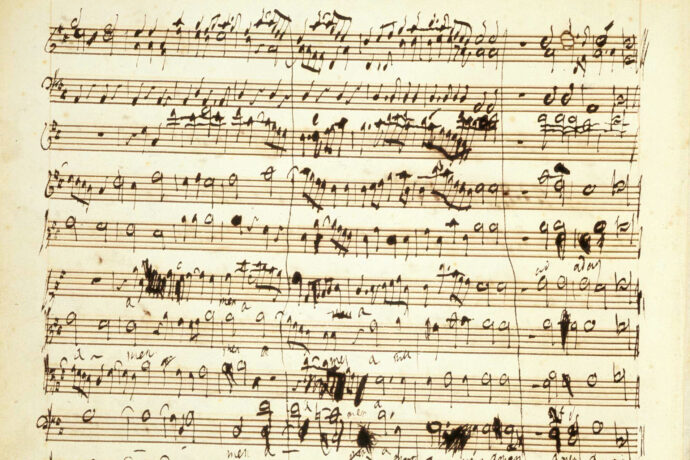You can shut your eyes to the tinsel and trimmings, but the sounds of the Advent season—its carols, cantatas, and choruses—will get to you one way or another.
This is the season when choral music aficionados will argue the merits of various renderings of G. F. Handel’s masterwork while pretty much ignoring the peculiar theology of the Charles Jennens libretto for Messiah—60 percent of which was stitched together from bits of the Hebrew Bible as viewed through the lens of Christian triumphalism.
But attention should be paid to the theology, especially to the question of who exactly is the “us” in in Part 1, No. 12: “For unto us a child is born.”
In historical context the answer is clear: the “us” in this chorus refers to the lords and ladies of Protestant England and England’s far-flung colonies and possessions, most notably its stupendous-wealth-generating sugar islands (Barbados and Jamaica, primarily) and its thriving North American plantations.
The emphasis on “Protestant” is important. The so-called Glorious Revolution of 1688 was all about ensuring Protestant rule forever by driving out James II and preventing this popish king’s newborn son from displacing his daughter Anne in the line of succession. The well-engineered Protestant putsch, which was hardly “bloodless,” involved insider intrigue to bring Holland’s William of Orange from across the eastern sea to consolidate Dutch-English power against the always-worrisome threat of Catholic France.
Across the western sea there remained a threat from Jacobite Irish Catholics, who had rallied behind the deposed James II. William made short work of this threat at 1690’s Battle of the Boyne: a victory that is still celebrated, as provocatively as possible, by Ulster’s Orange Order every July 12.
All this history bears directly on the creation of Messiah, because the work was first performed in Dublin under the sponsorship of the Lord Lieutenant of Ireland: the very embodiment of the Protestant Ascendancy in Ireland brought about by William’s triumph at the River Boyne.
What is really going on behind the curtain, as it were, of Messiah’s emergence into Christian consciousness?
There is first the Protestant eclipse of Catholic power in Europe and (somewhat later) in North America. The oratorio is celebrating Christ’s triumph over sin and death, obviously, but in view of the historical context it becomes hard not to hear how it also celebrates William’s “glorious” coup.
It is hard not to hear the voice of empire rising.
There is also in the oratorio a very clear statement that Jesus is God’s Anointed, the long-awaited messiah, and that Gentile Christians have replaced the Jews as the center of God’s covenantal care. This belief, known as supersessionism in theological circles, comes in both mild and strong forms. In the Jennens libretto it comes in the strongest possible form, and those of us who love the music might bear that in mind even as we thrill to the mighty choruses. The grief that has come to the Jewish people on account of this strong-form supersessionism is literally immeasurable.
But there is yet more, and this “more” was already poisonously present in Catholic thought long before Protestantism’s apotheosis in Britain. Yale theologian Willie James Jennings, in his indispensable book on theology and the origins of race, pinpoints how the entire European colonial enterprise was rooted from the start in Christian supersessionism. At the very moment (1492) when the Jews were being expelled from the Iberian Peninsula, the European colonizers, believing themselves to be the sole bearers of God’s covenantal favor, sailed off to the Caribbean and to the coasts of Africa, where, arriving as guests of the indigenes, they immediately declared themselves to be the hosts and owners of all they surveyed.
They set themselves up as the judges of the relative worthiness of the native peoples, and very soon this judging was fatally calibrated according to skin color.
“Supersessionist thinking is the womb in which whiteness will mature,” writes Jennings. The displacement of the Jews was but the prelude to 500+ years of brutal displacements (and defacements) directed against people of color in Christ’s name. Catholic Spain and Portugal got the ball rolling, but no one ever did the displacement/expropriation thing better than the Protestant English (including, of course, their North American “cousins”).
Which brings us back yet again to 1742 and Messiah and all the wealth and power of 18th century Britain: a wealth and power extracted primarily from Black bodies.
We should note that imperial triumphalism was everywhere in Georgian England, not just in the work of Handel and Jennens. Take, for example, this verse in the Isaac Watts hymn “Jesus Shall Reign,” composed during this same period:
From north to south the princes meet, to pay their homage at His feet;
While western empires own their Lord, and savage tribes attend His word.
Those “savage tribes” would attend, all right, but not without imperial coercion.
If you call yourself a Christian, none of this Advent bad news need spoil your Christmas celebration, but it might help temper that celebration with a bit of sobriety and humility. If you are lucky, your responsible preacher will remind you that Jesus of Nazareth never presumed himself to be Israel’s promised messiah (all of those NT sayings are later interpositions); she will remind you that the Reign of God this upstart Galilean rabbi proclaimed was neither more nor less than the restoration of a Torah-centered covenantal righteousness; she will warn against the dangerous arrogance reflected in supersessionist thought.
A lot of unhelpful accretions need to be pared away, in other words. And yet, for any Christian with eyes to see, there remain grounds for hope and joy precisely in the powerlessness and vulnerability of a little Jewish baby, born to poor parents in a distant province during the reign of the all-powerful Caesar Augustus. Hope coming precisely from the counterimperial path that this nonviolent and always-vulnerable prophet would set for himself as a young teacher; joy coming precisely from the continuing relevance of nonviolent witness and nonviolent revolution in a world deformed by the violence of all bloody-minded oppressors and exploiters.
There is still a gift for us at Christmas; it’s just not the triumphalist gift we were led to believe.





